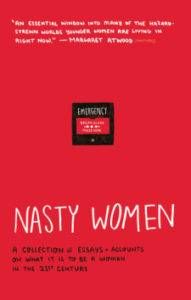The collection launches on March 8th to mark International Women’s Day. Rioters, every March 8th for the past five years I have been asked when International Men’s Day is. This year, I am hoping to avoid this brand of idiocy, but in case this happens to you, please note that International Men’s Day is on November 19th and that the ‘block’ button is your friend. The premise of Nasty Women is pretty simple: life as a woman right now is bloody hard, and the normalisation of inequality is persistently marching forward. Some days, it feels as though many of the gains we have made for women are slowly being rolled back or freshly questioned. The book contains a series of essays expressing the perspectives of women- all types of women, from all walks of life- in the 21st century. Rioters, this one is a real breath of fresh air. In the past few years, women have contributed to and produced a number of brilliant books about the female experience, but this one sought out entirely new voices to talk plainly about being a lady and it’s immensely successful as a result. I read these types of collections all the time, but I really learned some important things from this one that I hadn’t really taken note of before. I don’t want to spoil the collection before you read it (and you really should read it, doubly so if you’re NOT a woman), but I had a particularly strong reaction to Jen McGregor’s essay about living with the after-effects of contraception and Laura Waddell’s essay from a working class perspective. Contraception is a difficult issue for women right now- for years we have been struggling with the weight of side effects that were never adequately explained or properly contemplated and the reality of constant hormonal imbalance in the body is a relatively new topic of mainstream debate. Equally, Laura Waddell has a working class perspective and the author herself believes that the working class perspective is often lost, even in fiction (with the possible exception of Elena Ferrante). Based on the power in this essay, we clearly need to hear more from working class women and arguably the publishing industry as a whole has a responsibility to make that happen. One of the surprise essays in here was from Alice Tarbuck, who writes about the ongoing trend for foraging and natural produce, particularly in the UK. Tarbuck’s essay is full of information but most importantly, she frames the new focus on foraging in its proper context- namely that, in the past, Wise Women who foraged and healed were sometimes accused of witchcraft and suffered endlessly at the hands of a moral panic. This essay has a real feminist arc but talks about an activity that many will have forgotten stemmed from women and the services they delivered to communities who desperately needed them. Perhaps needless to say, American politics and foreign policy bear heavily on some of the content of the book, particularly for essayists who are women of colour or LGBTQ contributors. This makes the collection feel real and current- but perhaps the best thing about this book is the intersectionality. As a cisgender, white Irish woman living in England, intersectionality isn’t an experience I can own and therefore I try to read about it as much as possible- I think I owe at least that much to every other woman, whether I know them or not. Collections like this are real eye openers for me. Hearing so many different voices, from across a spectrum of lives and experiences, better arms me to stand up and fight for all women- not just the ones who look and act like I do. Pick this collection up. Be a Nasty Woman- preferably, as loudly as you can.
